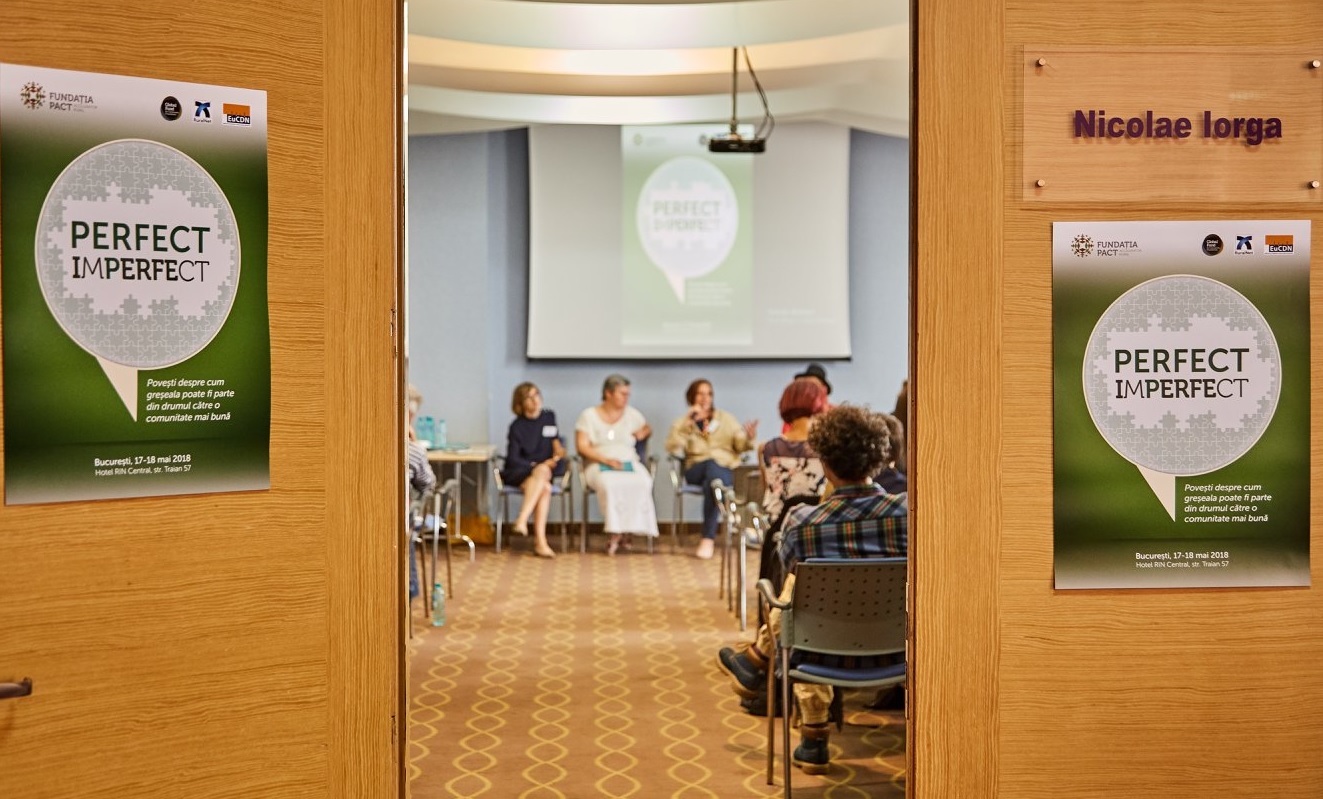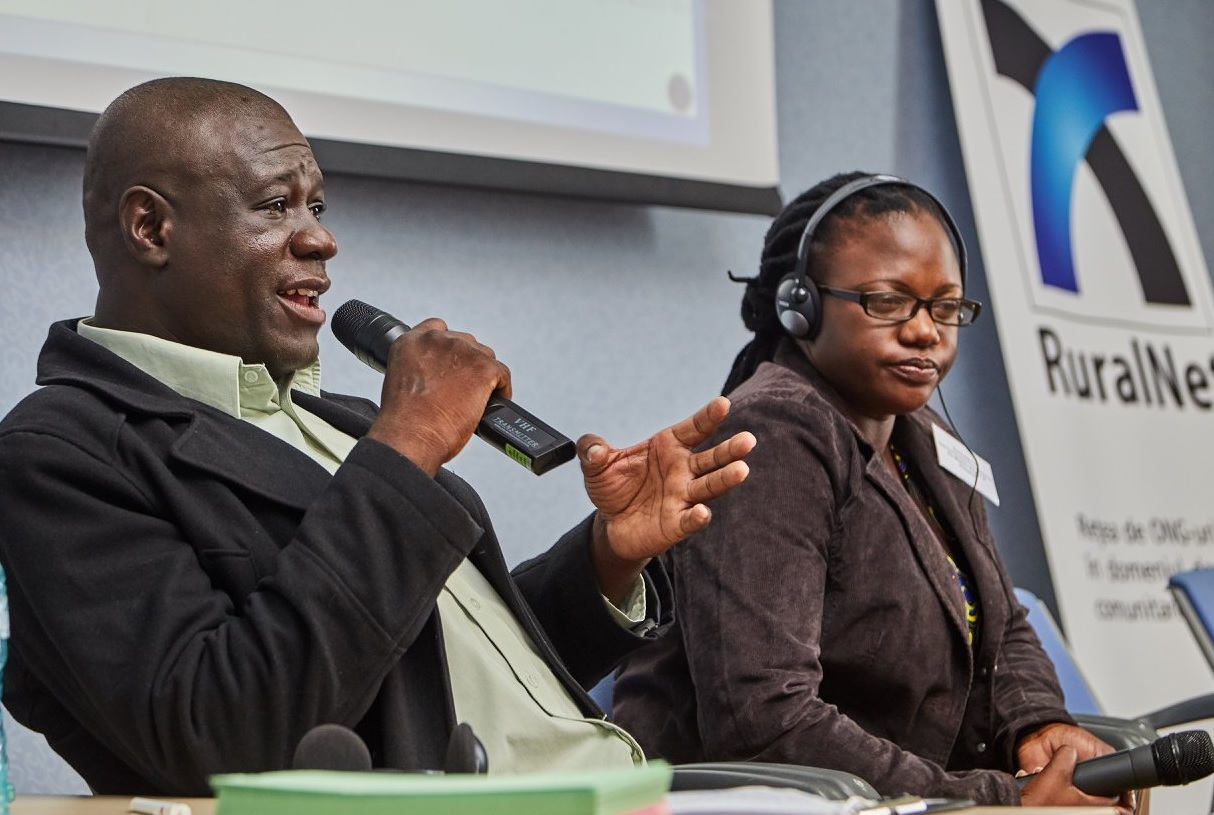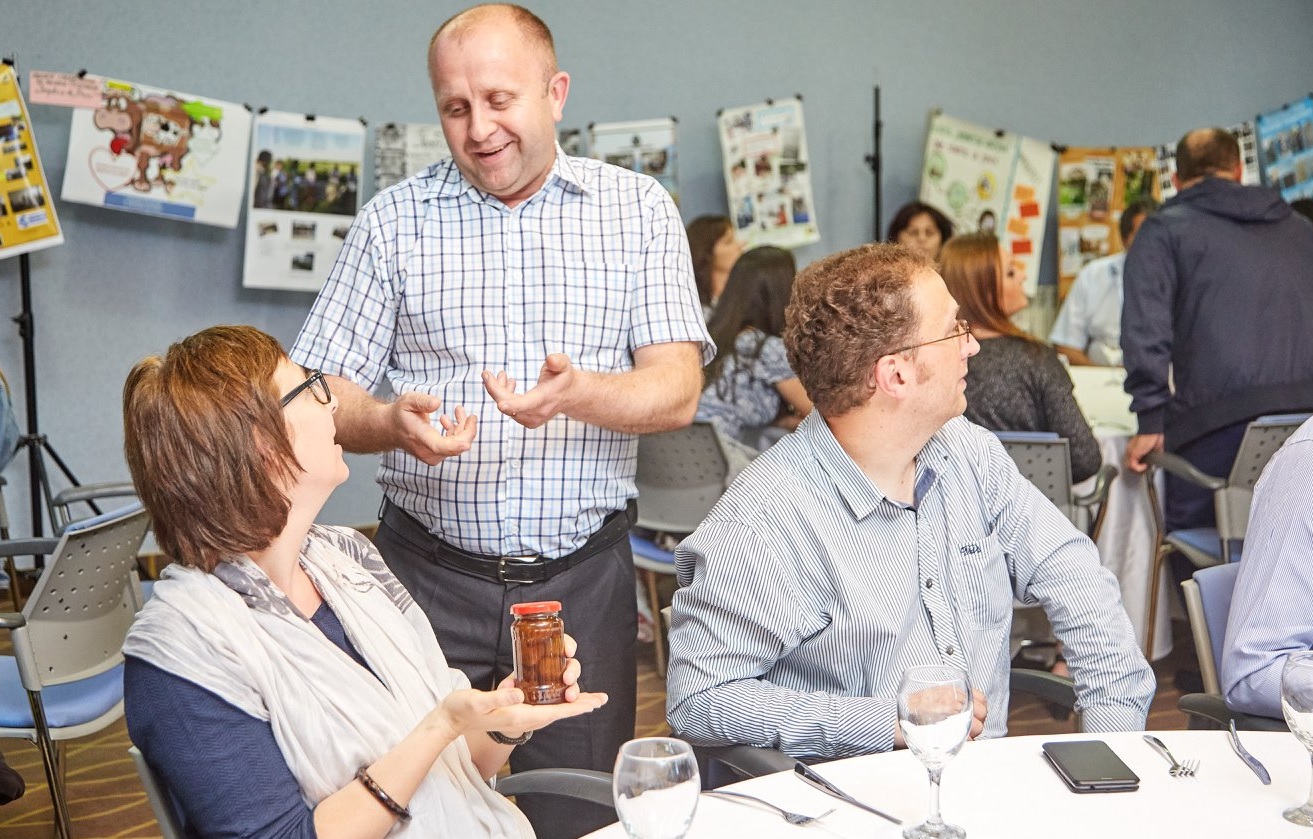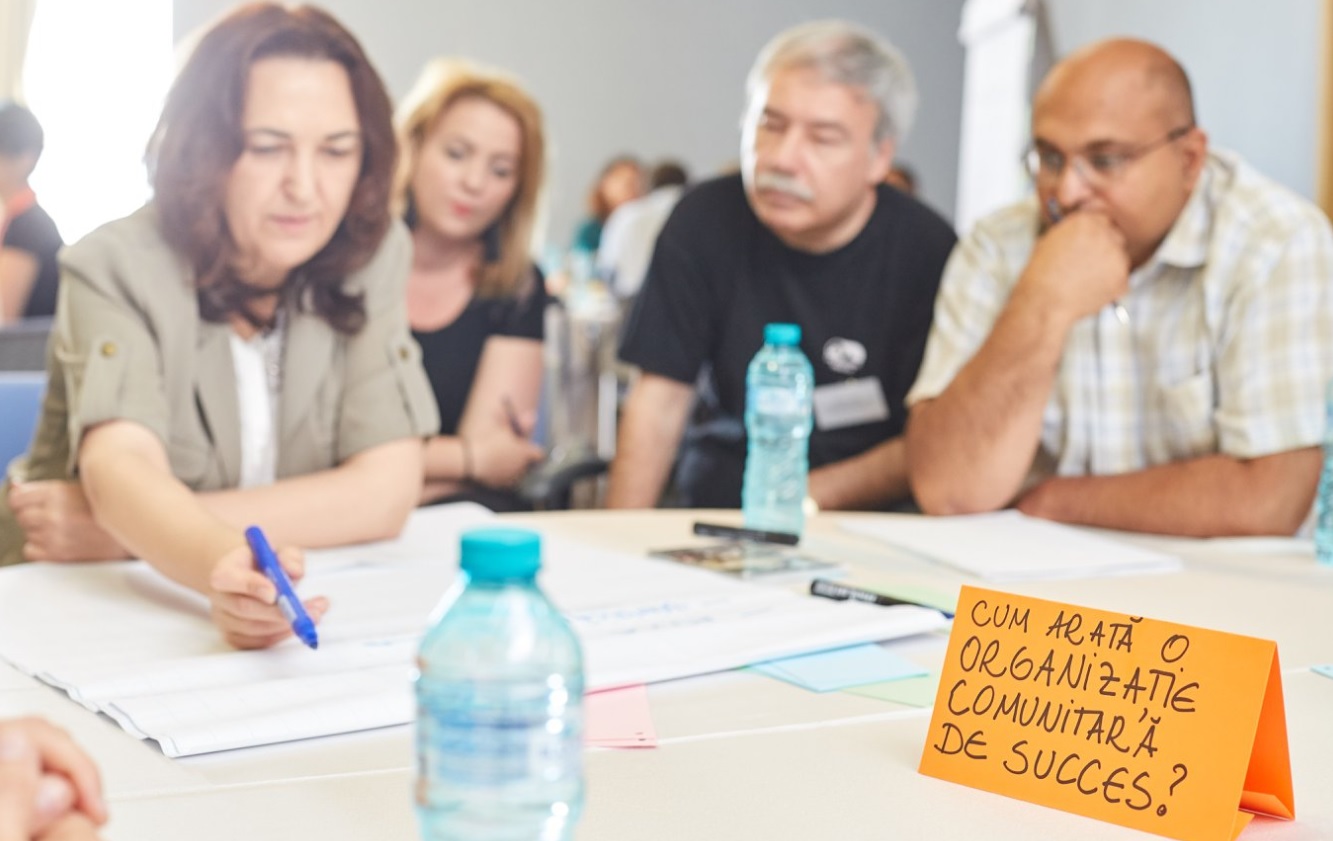“Perfect / Imperfect” – how the PACT Foundation turns “failures” into learning
28 Aug 2018
 All photos on this page © Valentin Boboc
All photos on this page © Valentin Boboc
“It’s only a failure if you hide it under the rug. Otherwise, it’s an opportunity to learn.” So said one participant at a lively workshop examining failures, set-backs and how to learn from them, which Romania’s PACT Foundation co-organized from 17 – 18 May 2018. The event, “Perfect / Imperfect” encouraged participants to share their stories of projects and programmes not going according to plan, thereby also debunking the myth that social change is neat, linear, and devoid of surprises. The GFCF spoke to Irina Pop, PACT’s former Advocacy and Programme Director and pro-bono collaborator to the event, to hear more.
GFCF: Where did the idea for the event come from?
Irina Pop (IP): The inspiration for the event came from the #ShiftThePower movement and the Global Summit on Community Philanthropy, organized by the GFCF in 2016. For us at PACT, and for me personally as a participant, the Summit was the opportunity to stand together with dozens of other community philanthropy actors, and their support organizations, from around the world. And our message was clear: top-down development approaches often don’t, even with the best of intentions, fully grasp the realities at the grassroots level, and moreover struggle to meaningfully involve local communities in achieving change.
Over the course of more than 12 years, PACT has worked with more than 170 community groups, sometimes with as many as 50 at the same time, as a support organization that builds capacity and provides seed funding for community development projects. Some community groups have stood the test of time and developed into self-sustaining community-based organizations, while others have decided to end their activities after completing one or more community projects. In some cases we have built long lasting relationships, based on trust, with members of the groups.
But in other cases we have admittedly over-reached, creating expectations for results that could not be met within the course of a project, and which were not sustained by continued support and funding. Internally, PACT’s team acknowledged our shortcomings and tried to learn from them, integrating our lessons into new programming. But we began to feel that it would be even more constructive to share such learning with the people we were working for and with: our partners and the organizations we support.
Moreover, there are at least a dozen other organizations in Romania who act as support organizations for grassroots initiatives in rural and community development, philanthropy, entrepreneurship, etc. When we come together at events, or when we publish programme results, it is usually in order to celebrate successes and to highlight examples of good practice. While these are of course inspiring, we also thought that some of the most valuable and thought-provoking lessons, for us and for others, arise from stories of difficulty and how it was overcome, as well as from stories of downright failure and how it was managed (and what was changed to avoid it again, further down the road).
We saw this event as an occasion to bring together members of the communities we work with, partners, other organizations from Romania and from abroad who do similar work, and members of the communities they work with, so that we could all sit together and be frank about the things that need to be done better or differently. Ultimately, this is how we envision strengthening grassroots development in Romania – in other words, and to return to the Summit, how we #ShiftThePower.
 Mathamsanqa Moyo & Buhle Ndlovu, CFWRZ discuss endowments
Mathamsanqa Moyo & Buhle Ndlovu, CFWRZ discuss endowments
GFCF: What were some of the highlights of the two days?
IP: The first part of the event was dedicated to stories of mistakes, failures or obstacles and how these were managed, or turned into opportunities. Examples were shared candidly by members of PACT’s team, as well as representatives of community organizations. Highlights from the first session included inspiring stories from our international partners: colleagues from the Community Foundation for the Western Region of Zimbabwe (CFWRZ) spoke about their challenges building an endowment fund, while a representative of the Scottish Centre for Community Development talked about the importance of bridging knowledge across countries. This was followed by parallel workshops on topics such as: social entrepreneurship in vulnerable and discriminated communities; advocacy for policy change in small communities; and, resource mobilization and making community organizations more sustainable.
After some powerful opportunities to “tell it like it is”, the second part of the event moved towards discussions around learning, turning failure into success and, perhaps most importantly, defining what success means and what it looks like for our organizations. Some of the best moments were the live contributions and feedback from the audience, which were submitted via SMS to the organizers’ phone, and which were also displayed live on a screen for all to see.
GFCF: Did you have the sense that your partners were hesitant to share sensitive stories of mistakes, failures, errors?
IP: Quite the opposite! Though we did think that in order to jumpstart the conversation, PACT as the organizer had to be the first to share examples of our own mistakes. So we kicked off the event with our Programmes Director openly discussing a project that had “failed” with individuals in the audience who were beneficiaries of that project. We found that this “broke the ice”, and that our transparency and humility was welcomed. After that opening, my impression is that participants really embraced the opportunity to talk about themselves: what is difficult about their work, what isn’t going so well, etc.
Our aim – and probably the biggest success of the event – was making sure that over the course of the two days every participant had the chance to speak up. This was especially important for members of some communities who are not used to having their voices heard.
GFCF: Would you encourage other organizations to initiate similar discussions with their own partners?
IP: We would certainly encourage organizations to initiate frank discussions about mistakes with their partners, beneficiaries and even donors. Our experience has been that such openness about failures and the resulting learning has not damaged PACT’s reputation amongst our peers and partners. It has instead contributed to building trust, strengthening relationships and enhancing a culture of sincere communication – all of which are vital to our work.

GFCF: Based on your learning from the two days, will the PACT Foundation be changing/adapting anything in its own work moving forward?
IP: Actually, the first lessons we picked up were from the mistakes we made planning this very event…funny but true! As in the past, we wanted to get a little bit too much out of a two day event (ambition is a hard nut to crack!), so next time around, we would certainly like to make the event longer. Also in terms of the event itself, we tried to make it as unstructured as possible, letting participants define the agenda and how the time was used. However, we should certainly have included more time for informal networking. As with children’s education, we should acknowledge that free “play” is as valuable as structured learning, especially when the goal is to get people to communicate openly. We and others as event organizers should pay more attention to this lesson in the future.
One of the best surprises of the event was that not only did most of the participants agree that we should do this again, together, but that a handful of self-organized participants proposed creating an online network of all the participants, so that we could continue sharing lessons and opportunities for partnership beyond the event. An online group of almost 50 people has since been created, which is managed by volunteers.
Overall, the event “Perfect / Imperfect” has reinforced PACT’s commitment to improve its programming based on lessons from past mistakes, to more consistently extract and use sincere feedback from beneficiaries and partners, but also to openly promote and set an example of transparency and frankness among similar organizations. In other words – not to hide our failures under the rug.
Perfect / Imperfect was co-organized by the PACT Foundation in partnership with RuralNet – The Romanian Network for Community Development, and EuCDN – European Community Development Network. It was supported with a grant from the GFCF.


